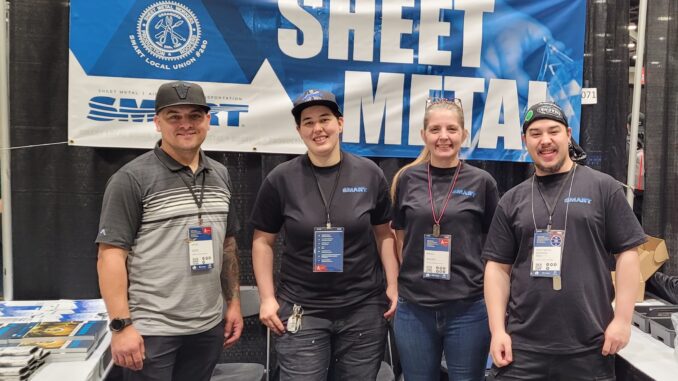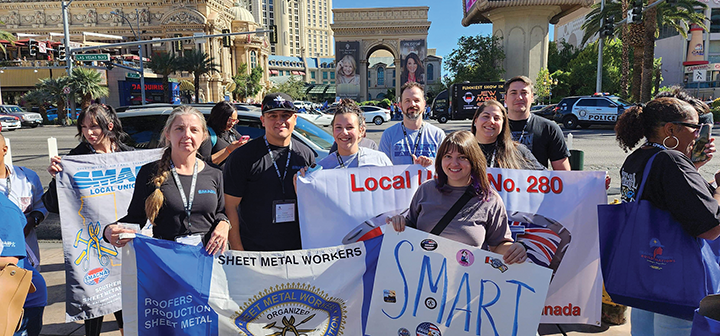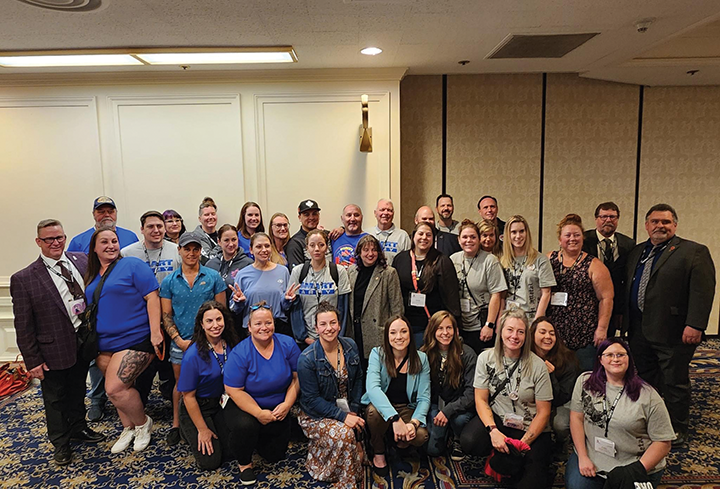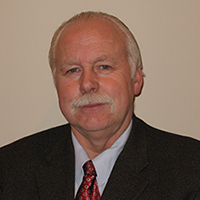
Local 280 has doubled the number of women in their program—how more inclusive optics are growing the construction workforce in BC
By / Jessica Kirby
In 2019, then-president of SMART International Joseph Sellers put out a challenge for all locals to be more diverse and inclusive. Speaking at the Tradeswomen Build Nations Conference, he pledged to work harder as a union:
“We have a lot of work to do. We will roll up our sleeves,” he said. “We will make sure we are more inclusive, better in diversity, and we will continue to move our International in that fashion. We will do better tomorrow than we did today.”
Sellers gave credit to the SMART Women’s Committee, which was instrumental in the passing of amendments and resolutions aimed at diversity and fair treatment for all members at the SMART Convention in 2019. One such resolution was to double the number of SMART women by the next convention in five years.
At the time, the Local 280 had fewer than 30 female members. Steve Davis, Local 280’s current organizer, was working at Apollo Sheet Metal and not yet in the union office. In March 2020, when Davis joined the union office, this was one of the challenges he accepted and tried to address. “I sat down with then-Business Manager Jim Paquette and discussed various avenues to increasing our female membership,” Davis says. “Some of those strategies involves visiting high schools, job fairs, and other ways to get information about the trade out to people because we are not a very well-known trade.”
The first year was, in Davis’ words, a bit rough. They brought in approximately ten female journeypersons and apprentices, bringing the total to 40. It wasn’t enough.
“We worked with the school board and trades programs, we shared information by word of mouth, and we really pushed the limits of what we’d done in the past,” Davis says. “Today, we have just under 70 women registered as apprentices or ticketed journeypersons.”

The numbers are growing. Part of that has to do with general contractors setting internal goals to employ more female, Indigenous, and non-traditional tradesworkers, but it also reflects a shift in recruitment momentum.
“We worked with companies that have never had a female employee and now they have six or seven,” Davis says. “We are looking at the other trades and realizing that we either need to work together and get on board with hiring from all genders and ethnicities and be more open-minded or we are going to be left behind.”
The Local as experienced tremendous support from industry partners, including SMACNA-BC, which provided placement assistance and cast an important beacon for women thinking about joining the trades.

“Those partnerships were crucial in instigating change,” Davis says. “People tend to be fearful of change. It’s a job site in the construction industry, and there are some outdated, stereotypical ideas about whether that is the right place for women. But when our SMART International mandates it and SMACNA promotes it and the Tradeswomen Build Nations conference is a huge success, it opens our eyes and contractors’ eyes.”
The sentiment that race, physical appearance, and gender don’t matter is growing among all trades as a more diverse workforce shows up on job sites. For example, once women become visible on job sites, the idea of taking women on seems less novel and more par for the course.
“The electricians and plumbers are big on bringing women into the trades, so it was just a matter of time before other trades saw that example and started looking for more members,” Davis says. “Then the floodgates opened.”
Local 280 took every opportunity to reach out through various events, often with a female apprentice or journeyperson to improve optics.
“Attending with a female member was a big factor,” Davis says.
So was Davis’s approach to recruitment.
“I’m very passionate about our trade,” he says. “So, I was just selling what our trade was and is without trying to make my talk gender specific. I didn’t think about barriers or limitations—I was just focused on delivering good information about our trade to anyone who was interested.”
Sheet metal is an anomaly in the construction world because rather than buying pre-made materials, sheet metal workers are masters of a true craft-trade.
“It doesn’t matter who you are—any person can be creative and build—they just need the right environment,” he says.
Moving forward, Local 280 intends to focus on involving ambassadors—women who are new journeypersons and higher level apprentices who can assist with recruitment and come out to events to increase visibility.
“It makes a huge difference when individuals approach us at a tradeshow and they see someone relatable or someone who looks like them,” Davis says. “Having someone who understands their experience is helpful and pivotal to the recruitment process.”
Davis works with Access Indigenous and Bladerunners trying to help attract youth who might need a shift in direction. He also intends to keep working with high schools and trade programs to find a diverse cross-section of individuals interested and providing opportunities to work in the union sector.
Every year, Local 280 is turning 80 to 100 apprentices to journeypersons and has 350 apprentices in technical training. The pressure is on to recruit more skilled labour.
“We have just over 2,100 members, which is the highest it has been since I can remember,” Davis says. “We are also looking to create a recruitment team, which should alleviate some of the pressure. We want people who want to be involved and who value the trades and recruiting skilled labour.” ■



